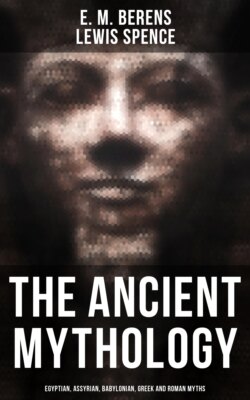Читать книгу The Ancient Mythology: Egyptian, Assyrian, Babylonian, Greek and Roman Myths - Lewis Spence - Страница 53
На сайте Литреса книга снята с продажи.
Dibarra
ОглавлениеDibarra was probably a variant of Nergal, in his guise as solar destroyer. Concerning him a strange myth is recounted as follows:
"The sons of Babylon were as birds and thou their falconer. In a net thou didst catch them, enclose them, and destroy them, O warrior Dibarra. Leaving the city, thou didst pass to the outside, taking on the form of a lion, thou didst enter the palace. The people saw thee and drew their weapons."
So spoke Ishum, the faithful attendant of Dibarra, by way of beginning an account of the havoc wrought in the valley of Euphrates by the war- and plague-god. "Spare no one," is the gist of his commands to his satellites. "Have neither fear nor pity. Kill the young as well as the old and rob Babylon of all its treasures."
Accordingly against the first city a large army was dispatched to carry out these instructions, and the battle with bow and sword was begun, a strife which ended so disastrously for the soldiers and inhabitants that their blood flowed "like torrents of water through the city's highways." This defeat the great lord Merodach was compelled to witness, powerless to help or avert it. Enraged at his helplessness and overcome with fury, he cursed his enemies until he is said to have lost consciousness because of his grief.
From this scene of devastation Dibarra turned his attention to Erech, appointing others of his host to mete out to this city the fate of Babylon. Ishtar, goddess of Erech, saw her devoted city exposed to plunder, pillage, and bloodshed, and had to endure the agony of inactivity experienced by Merodach. Nothing she could do or say would stay the violence of Dibarra's vengeance.
"O warrior Dibarra, thou dost dispatch the just, thou dost dispatch the unjust; who sins against thee thou dost dispatch, and the one who does not sin against thee thou dost dispatch."
These words were used by Ishum, Dibarra's servant, in a subsequent address to the god of war. He knew his lord's craving for battle and bloodshed was still unappeased, and he himself was planning a war more terrible than any he had yet conducted, a conflict not only world-wide but which was to embrace heaven itself. So in order to gain Dibarra's consent to the hideous destruction he anticipated, he continued to pander to his war-like tendencies.
Said he: "The brightness of Shul-panddu I will destroy, the root of the tree I will tear out that it no longer blossom. Against the dwelling of the king of gods I will proceed."
To all of which the warrior-god listened with growing pleasure, until fired by his myrmidon's words he cried out in sudden fierce resolve—"Sea-coast against sea-coast, Subartu against Subartu, Assyrian against Assyrian, Elamite against Elamite, Cassite against Cassite, Sutaean against Sutaean, Kuthean against Kuthean, Lullubite against Lullubite, country against country, house against house, man against man. Brother is to show no mercy towards brother; they shall kill one another."
"Go, Ishum," he added later, "carry out the word thou hast spoken in accordance with thy desire."
And with alacrity Ishum obeyed, "directing his countenance to the mountain of Khi-khi. This, with the help of the god Sibi, a warrior unequalled, he attacked and destroyed all the vineyards in the forest of Khashur, and finally the city of Inmarmaon. These last atrocious acts roused Ea, the god of humanity, and filled him with wrath," though what attitude he adopted towards Dibarra is not known.
"Listen all of you to my words, because of sin did I formerly plan evil, my heart was enraged and I swept peoples away."
This was Dibarra's defence when eventually he was propitiated and all the gods were gathered together in council with him. Ishum at this point changing his tactics urged on Dibarra the necessity for pacifying the gods he had incensed.
"Appease," said he, "the gods of the land who are angry. May fruits and corn flourish, may mountains and seas bring their produce."
As he had listened to Ishum before, Dibarra listened again, and the council of the gods was closed by his promising prosperity and protection to those who would fittingly honour him.
"He who glorifies my name will rule the world. Who proclaims the glory of my power will be without rival. The singer who sings of my deeds will not die through pestilence, to kings and nobles his words will be pleasing. The writer who preserves them will escape from the grasp of the enemy, in the temple where the people proclaim my name, I will open his ear. In the house where this tablet is set up, though war may rage and the god Sibi work havoc, sword and pestilence will not touch him—he will dwell in safety. Let this song resound for ever and endure for eternity. Let all lands hear it and proclaim my power. Let the inhabitants of all places learn to glorify my name."
